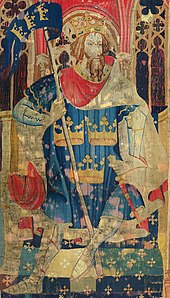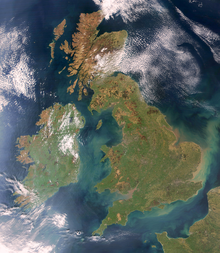| Revision as of 07:15, 12 August 2021 edit2409:4061:2dca:e4d4:3cc2:59d5:2817:d2e4 (talk) →Nationalism and unionism← Previous edit | Revision as of 08:14, 12 August 2021 edit undo2409:4061:2dca:e4d4:3cc2:59d5:2817:d2e4 (talk)No edit summaryNext edit → | ||
| Line 1: | Line 1: | ||
| {{distinguish|English nationalism}} | {{distinguish|English nationalism}} | ||
| ] |
], in addition to being the flag of the United Kingdom, also serves as a common symbol used by British nationalists]] | ||
| ] was the first monarch of the ]]] | |||
| ], the king of the ancient ], depicted as one of the ] in tapestry, c. 1385. The legend of King Arthur as a warrior ruler and ] hero as depicted by ] in '']'' laid the foundation of British nationalism.]] | ], the king of the ancient ], depicted as one of the ] in tapestry, c. 1385. The legend of King Arthur as a warrior ruler and ] hero as depicted by ] in '']'' laid the foundation of British nationalism.]] | ||
| ] and ]. Originally British nationalism was |
] and ]. Originally British nationalism was applicable to ]. British nationalism typically focuses on the unity of ] and ].]] | ||
| '''British nationalism''' asserts that the ] are a ] and promotes the cultural unity of ],{{sfn|Motyl|2001|pp=62-63}}<ref name="Guntram H. Herb 2008">Guntram H. Herb, David H. Kaplan. Nations and Nationalism: A Global Historical Overview: A Global Historical Overview. Santa Barbara, California, USA: ABC-CLIO, 2008.</ref> in a definition of ] that may include people of ], ], ], and ] descent (those living in both ] and ] and historically the whole of ] when it was within the United Kingdom).{{sfn|Motyl|2001|pp=62-64}} British nationalism is closely associated with ], which seeks to uphold the political union that is the ], or strengthen the links between the countries of the United Kingdom.<ref name="Mil133">{{harvnb|Miller|2005|p=133}}.</ref> | '''British nationalism''' asserts that the ] are a ] and promotes the cultural unity of ],{{sfn|Motyl|2001|pp=62-63}}<ref name="Guntram H. Herb 2008">Guntram H. Herb, David H. Kaplan. Nations and Nationalism: A Global Historical Overview: A Global Historical Overview. Santa Barbara, California, USA: ABC-CLIO, 2008.</ref> in a definition of ] that may include people of ], ], ], and ] descent (those living in both ] and ] and historically the whole of ] when it was within the United Kingdom).{{sfn|Motyl|2001|pp=62-64}} British nationalism is closely associated with ], which seeks to uphold the political union that is the ], or strengthen the links between the countries of the United Kingdom.<ref name="Mil133">{{harvnb|Miller|2005|p=133}}.</ref> | ||
| Line 14: | Line 13: | ||
| {{see also|Unionism in the United Kingdom}} | {{see also|Unionism in the United Kingdom}} | ||
| Nowadays, as in the past, unionist movements exist in ], ] and ]. These movements seek specifically to retain the ties between those areas and the rest of the ], in opposition to civic nationalist movements. | Nowadays, as in the past, unionist movements exist in ], ] and ]. These movements seek specifically to retain the ties between those areas and the rest of the ], in opposition to civic nationalist movements. | ||
| ==Fascism== | |||
| {{excerpt|British fascism}} | |||
| ==See also== | ==See also== | ||
Revision as of 08:14, 12 August 2021
Not to be confused with English nationalism.


British nationalism asserts that the British are a nation and promotes the cultural unity of Britons, in a definition of Britishness that may include people of English, Scottish, Welsh, and Irish descent (those living in both Northern Ireland and Great Britain and historically the whole of Ireland when it was within the United Kingdom). British nationalism is closely associated with British unionism, which seeks to uphold the political union that is the United Kingdom, or strengthen the links between the countries of the United Kingdom.
British nationalism's unifying identity descends from the ancient Britons who dwelt on the island of Great Britain. British nationalism grew to include people outside Great Britain, in Ireland, because of the 1542 Crown of Ireland Act, which declared that the crown of Ireland was to be held by the ruling monarch of England as well as Anglo-Irish calls for unity with Britain.
It is characterised as a "powerful but ambivalent force in British politics". In its moderate form, British nationalism has been a civic nationalism, emphasizing both cohesion and diversity of the people of the United Kingdom, its dependencies, and its former colonies. However, nativist nationalism has arisen based on fear of Britain being swamped by immigrants; this anti-immigrant nativist nationalism has manifested politically in the British National Party and other nativist nationalist movements. Politicians, such as former British prime minister David Cameron, have sought to promote British nationalism as a progressive cause.
Nationalism and unionism
| This section does not cite any sources. Please help improve this section by adding citations to reliable sources. Unsourced material may be challenged and removed. (May 2021) (Learn how and when to remove this message) |
Nowadays, as in the past, unionist movements exist in Scotland, Wales and Northern Ireland. These movements seek specifically to retain the ties between those areas and the rest of the UK, in opposition to civic nationalist movements.
Fascism
This section is an excerpt from British fascism.British fascism is the form of fascism which is promoted by some political parties and movements in the United Kingdom. It is based on British ultranationalism and imperialism and had aspects of Italian fascism and Nazism both before and after World War II.
Historical examples of fascist organisations in Britain include the British Fascists (1923–1934), the British National Fascists (1924–1928), the Imperial Fascist League (1929–1939), the British Union of Fascists (1932–1940), the British League of Ex-Servicemen and Women (1937–1948), the National Socialist League (1937–1939), The Link (1937-1940), the British People's Party (1939–1954) and the Union Movement (1948–1978). More recent examples of British fascist groups include the British Movement (1968–1983), the National Front (1967–present), the British National Party (1982–present), Britain First (2011–present), National Action (2013–2017), and the Sonnenkrieg Division (2015–2020). Parties inspired by British fascist movements include the New Zealand National Front (1968–2019) and the Australian Protectionist Party (2007–present).See also
- Pan-nationalism
- Pan-Celticism
- British unionism
- Cornish nationalism
- English nationalism
- Irish nationalism
- Scottish nationalism
- Welsh nationalism
- Ulster nationalism
- Britishness
- Civic nationalism
- Ethnic nationalism
References
Notes
- Motyl 2001, pp. 62–63.
- ^ Guntram H. Herb, David H. Kaplan. Nations and Nationalism: A Global Historical Overview: A Global Historical Overview. Santa Barbara, California, USA: ABC-CLIO, 2008.
- Motyl 2001, pp. 62–64.
- Miller 2005, p. 133.
- Brendan Bradshaw, Peter Roberts. British Consciousness and Identity: The Making of Britain, 1533-1707. P. 302.
- Smith, Smith & White 1988, p. 61.
- ^ Motyl 2001, pp. 64.
- Conservative Party leader David Cameron advocates liberal or civic British nationalism: "Cameron: I will never take Scotland for granted". Conservatives. 15 September 2006. Archived from the original on 24 September 2012.
Being British is one of the most successful examples of inclusive civic nationalism in the world.
The official party site. - Linehan 2000, p. 14. sfn error: no target: CITEREFLinehan2000 (help)
- Thurlow 2006, pp. 133–134. sfn error: no target: CITEREFThurlow2006 (help)
- Bienkov 2014. sfn error: no target: CITEREFBienkov2014 (help)
- Sabin 2014. sfn error: no target: CITEREFSabin2014 (help)
- BBC News 2020. sfn error: no target: CITEREFBBC_News2020 (help)
Bibliography
- Miller, William Lockley (2005), "Anglo-Scottish Relations from 1900 to Devolution and Beyond", Proceedings of the British Academy, 128, Oxford University Press, ISBN 978-0-19-726331-0
- Motyl, Alexander J. (2001). Encyclopedia of Nationalism, Volume II. Academic Press. ISBN 0-12-227230-7.
- Smith, Michael; Smith, Steve; White, Brian (1988), British foreign policy: tradition, change, and transformation, Routledge, ISBN 978-0-04-327081-3
External links
 Media related to British nationalism at Wikimedia Commons
Media related to British nationalism at Wikimedia Commons- UK National Democrats- A Manifesto for Britain
- British Nationalism: an idea whose time has come- BNP Manifesto 1997
- Rebuilding British Democracy- BNP Manifesto 2005
| Nationalism in the United Kingdom | |||||
|---|---|---|---|---|---|
| British |
| ||||
| Cornish |
| ||||
| English |
| ||||
| Irish |
| ||||
| Scottish |
| ||||
| Ulster |
| ||||
| Welsh |
| ||||